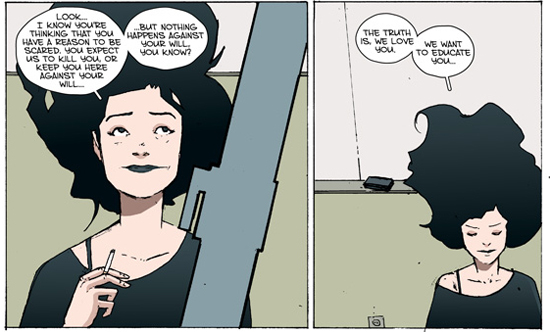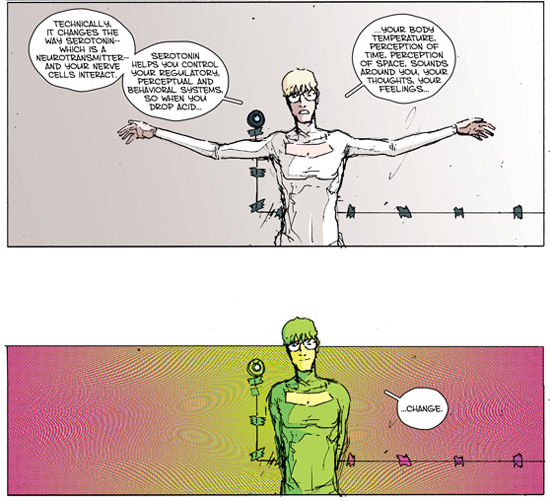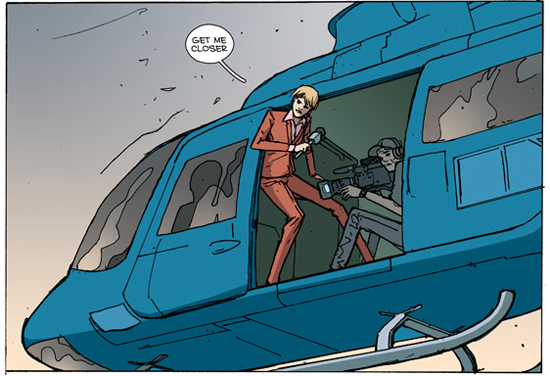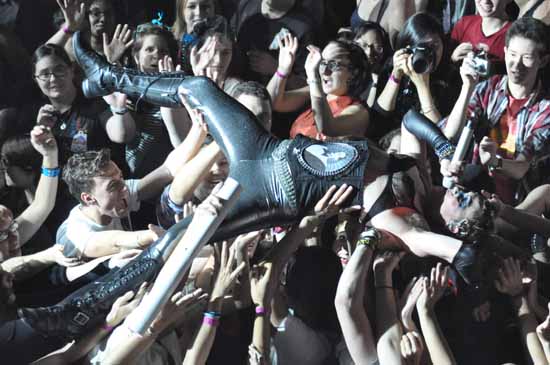by Aaron Colter

Wild Children by Ales Kot and Riley Rossmo is one of the bolder comic releases of late. With an industry still stuck in rehashing old characters and making blockbuster movies, Image Comics has given two independent creators the opportunity to publish a graphic novella that is equal parts teenage rebellion and conceptual reality.
SuicideGirls reached out to the creators to talk about the inspiration behind the book, since any review of it would contain spoilers. If you’ve already read Wild Children, this should give you some insight into the creative process behind the title. If you haven’t, don’t worry. This interview should give you enough reason to check it out soon at your local comics shop.
Aaron Colter: Ales, what made you want to write a book like this?
Ales Kot: About twenty different things, really. As with almost everything, the origin of Wild Children can be traced to my childhood. My parents led me to question authority and desire to understand things as they truly are, and not just as they are presented. I took it a bit further than my parents expected. I loved school in the beginning, but the overall atmosphere of it quickly unfolded itself as a prison-like structure created to build docile citizens that would perpetuate the already dead dream of capitalism and infinite growth. Pair that up with the messy divorce my parents went through when I was about ten, and I quickly realized things were much more complex than the teachers were saying. So I began questioning them, first with an honest interest, and then eventually just to piss them off, because being nice never got me anywhere with them – except for the few that were at least partially aware of the absurdity of the system they were both facing and keeping alive.
AC: Riley, what made you want to draw this story?
Riley Rossmo: Young people get often painted poorly in the media – either as violent geek shut-ins about to snap, or nymphomaniac cheerleaders. But the range is so much greater. Young people can be brilliant, well-intentioned individuals. Wild Children addresses some of that, it doesn’t fall back on typical teen archetypes.
AC: Following the tragedies in Colorado and Wisconsin, are you worried that Wild Children will be seen as insensitive or promoting violence?
AK: Not at all. Wild Children is not a cheap army propaganda-style FPS like Call of Duty. Ultimately, it will be whatever people decide to see it as, but that’s beyond my reach. The intent is not there, and we don’t care about cheap sensationalism, although the comic kind of invites it.
Anyone who uses fiction as a crux when explaining their own stupid decisions — “The Devil in the Comic/Game/Movie/Music Made Me Do It” is a person that needs therapy, and lots of love and patience. Anyone who supports that logic will likely require the same.
AC: Were you both rebellious kids? Did you get in trouble in school a lot?
RR: Yup. I couldn’t handle people telling what to do without giving me a reason. I loved reading, so I’d read all the assigned books, but thought it was a huge waste of time to regurgitate my thoughts in essay form. I was pretty angry – mostly I would skip class, go to the arcade and play video games or paint, draw or silk screen. I had a couple great art teachers that would let me do art in their classes, even though I was skipping other classes to be there. I liked girls – they were probably the biggest draw. And it was the best place to go to when you wanted to acquire anything illegal. Very little learning happened in the class.
AK: Yeah, once I hit a certain age, I definitely did my best to get in as much trouble as possible. It’s not that I wanted the trouble – I just wanted to show that I didn’t care for the fake rules and spineless non-authorities, and that they wouldn’t put me down. A history teacher once gave me a verbal test in front of the entire class because she suspected I was off my tits, and I got B+, although I should have gotten an A. Nearly everyone in the class knew about my state, so it’s still one of my fondest memories. Apart from that, I skipped school a lot, first because I simply hated it and was bullied, later because I just wanted to hang out with girls or read somewhere quiet on my own. I remember a school where some schoolmates used to do speed off the toilet boards, sex in class, things on fire…the first time I had a gun pointed at me was in front of the first school I went to. So I guess there was some trouble, yes.
AC: Are either of you familiar with the concept of brain-hacks? Essentially tricks to shape your reality. A new book called D.I.Y. Magic by Anthony Alvarado touches on some of these notions. I ask because Wild Children talks of magic. Are either of you interested in magic on any sort of level?
RR: I love magic. I like street magic, metaphysics, performers that use misdirection in new ways. I think there’s a lot more out there than I can conceive of. There’s so much in the world that can’t quite be coincidence, or chance.
AK: Oh, absolutely. I hack my brain – more accurately, my entire being – and Wild Children is definitely a brain hack, or at least an honest attempt at one. I meditate, explore reality, observe how my mind shapes it, do my best to learn as much as I can and then implement all the new tricks into my daily life. I haven’t heard of D.I.Y. Magic, but I’m going to read it now. I’m currently reading Colin Wilson’s The Occult for the first time and it’s a crucial experience. I don’t think there’s any difference between what we call magic and what we call science. It’s just about seeing the hidden strings and learning how to operate them. Words and pictures are some of the strongest magical/scientific properties in our daily arsenal, because they shape the reality we live in to an uncanny extent. And, as Harvey Pekar said, you can do anything with words and pictures…Magic. It’s fun. Take it seriously. Like it’s science. Because it is. Just work to see the hidden threads.

AC: The notion of comics being a separate reality or a meta-world within a world that we create is something that’s very Grant Morrison in ways that resemble his work The Filth and even concepts in The Invisibles. What other comics inspired this project?
AK: Kill Your Boyfriend by Grant Morrison and Philip Bond – a great story about teenage revolt that I loved as a kid. It’s very similar to Badlands and Natural Born Killers, it’s angry, it’s fresh, it’s short, and it packs a punch. I loved that comic, and it came out in the same format as Wild Children – a short graphic novella. I also thought about Shoot, the long-unreleased Hellblazer story about school shootings that DC Entertainment shelved back in the day because it was about to be released just as Columbine shootings happened. I disagreed with that decision – the comic wasn’t sensationalist at all, and it had some important things to say. When I conceived of Wild Children, I wanted to combine these two comic books into a new one, into a graphic novella that would feel truly 2012 while paying its respects to the stories that influenced its birth. Casanova and the brave way it approaches itself and the medium. Asterios Polyp for some of the more theoretical stuff in the middle. John Smith’s writing influenced the ending. Graphic novellas by Alan Moore, Warren Ellis and their collaborators. There are some nods to Frank Miller’s early work in the beginning. Dash Shaw’s work. Matt Seneca’s webcomix – I love Affected – and his comics theory as well.
The inspiration related to Wild Children hit from many different sources. Filmmakers like Cronenberg, Lynch, Godard, Kubrick and Tarkovsky were instrumental in forming my approach early on, and they still influence me a lot. Music by Flying Lotus, Fuck Buttons, Pictureplane, Aphex Twin, DJ Rupture, Kode 9, Burial, Coil, early Marilyn Manson. Al Columbia’s art, anything Brandon Graham does. Books by Hakim Bey, Robert Anton Wilson, Kenji Siratori, Jorge Luis Borges, P.K. Dick, Douglas Rushkoff and others. Some of the ideas in Rushkoff’s Life, Inc. influenced Wild Children quite directly.
AC: Something else that comes across in the book is that all of the adults seem threatened by teenagers, who are, for the most part, harmless on a large scale. Do you think society is afraid of teenagers in real life? If so, why?
AK: It’s quite clear that some parts of our society are afraid of teenagers in real life, yes. People who are shriveled inside, whether they’re physically young or old, forget to question things, and live in their temporary sand castles, often doing everything they can to keep them standing, regardless of how much harm that imposes on everyone and everything else. The teenagers inevitably belong to our society, and it’s often quite impossible to destroy their idealistic energy right away.
It’s not exactly correct to say that only young people push things forward – it’s people with a young attitude, wanting to learn, to discover the world, be in awe of the universe, that make the world a better place to live, and help us all evolve. But we’re often taught to expect the worst – 31% of Americans are likely to suffer from an anxiety problem at some point during their lifetimes – and when we’re worried or downright scared, rules make us feel safer, however temporary that illusory safety is. And rules are, by and large, something the new generations seems to have less and less use for. “Chaos is evil, rules are good.” is an excruciatingly stale narrative. The world is much more complex. Question everything.
AC: As bad as our generation may have it, there may be less opportunities for those just now starting to grow up. Why do you think more students in America don’t demand access to education in the same way students in other countries have?
AK: Because they don’t believe in the system, perhaps? I’m genuinely not sure if I can answer this question well enough, but I’ll do my best. I imagine that a huge part of it is the fact that we’re observing the collapse of capitalism, and whether we want to acknowledge it or not, we know that’s what’s happening. We’re offered a choice between a guy that believes that corporations are people, supports penalties for doctors who perform abortions, won’t release his tax returns and most likely would perform fellatio on a pig for a nickel, or a guy that supports extraordinary rendition, secret kill lists and illegal spying on the people he swore to serve and protect.
AC: If you could give you teenage self one piece of advice, what would it be?
RR: Make more art, and let your anger go.
AK: Do what thou wilt shall be the whole of the law. Wink, wink, wank.

For more information visit:
aleskot.com/
rileyrossmo.com/
imagecomics.com/
[..]












